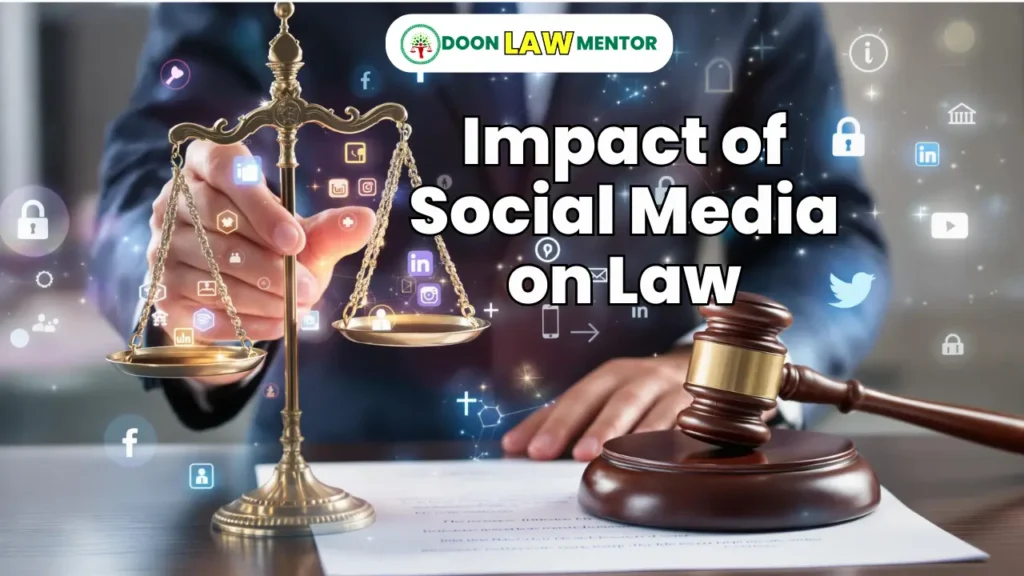Impact of social media on law is profound, reshaping how legal professionals practice, gather evidence, and manage public perception. This article delves into the benefits, challenges, and ethical dilemmas posed by social media in the legal landscape, offering insights for lawyers, judges, and the public.
Social media has become a powerful tool in modern society, influencing various aspects of life, including the legal profession and judicial systems. Platforms like Facebook, Twitter, Instagram, and LinkedIn have reshaped how legal professionals interact, evidence is collected, and public opinion affects the legal landscape. While offering numerous advantages, social media’s pervasive influence also poses ethical, regulatory, and procedural challenges for the law.
This article explores the multifaceted impact of social media on law, including legal practice, litigation, evidence, privacy concerns, and the judiciary, while offering insights into managing its risks.
Table of Contents
Introduction to Impact of Social Media on Law
Social media’s rapid growth has fundamentally changed the way individuals communicate and access information. This transformation extends to the legal field, where social media platforms are now integral in legal research, case strategy, and public discourse. However, their widespread use raises questions about ethics, privacy, and regulatory oversight.
By examining the interplay between social media and law, legal professionals can better understand its opportunities and challenges to uphold justice effectively.
Social Media and Legal Practice
Social media platforms have revolutionized legal practice by offering new ways to:
1. Networking and Branding
- Legal professionals use platforms like LinkedIn to build their personal brands, connect with peers, and expand their client base.
- Law firms showcase their expertise by sharing insights and achievements on platforms like Twitter and Instagram.
2. Client Interaction
- Social media enables lawyers to engage with clients directly, answer preliminary queries, and establish credibility.
- However, such interactions must comply with professional conduct rules to avoid ethical violations.
3. Legal Research
- Social media provides real-time updates on laws, regulations, and landmark judgments.
- Lawyers monitor platforms for trends in public opinion that may impact cases.
Social Media as Evidence in Courtrooms
Social media content often serves as critical evidence in both civil and criminal cases. Courts recognize posts, messages, and interactions as admissible evidence, provided they meet certain conditions.
1. Collection and Authentication
- Digital evidence must be authentic and relevant to the case.
- Tools like Forensic Toolkit (FTK) and X1 Social Discovery help extract and preserve social media data.
2. Types of Cases Influenced by Social Media Evidence
- Defamation: Posts that damage reputations often lead to lawsuits.
- Family Disputes: Social media activity can reveal lifestyle details relevant to divorce or custody battles.
- Criminal Cases: Posts or messages may establish motives, alibis, or involvement in crimes.
Challenges of Social Media on Legal Ethics
While social media enhances legal capabilities, it also raises ethical concerns, including:
1. Confidentiality Breaches
- Lawyers must avoid sharing confidential client information online, even unintentionally.
2. Conflict of Interest
- Interactions on social media can inadvertently breach conflict-of-interest rules, especially in contentious cases.
3. Misleading Advertising
- Legal professionals must ensure their social media content complies with advertising standards set by bar councils and legal authorities.
Privacy and Defamation Issues
1. Privacy Violations
- Social media posts often blur the line between public and private information.
- Unauthorized use of images or posts can lead to privacy infringement lawsuits.
2. Rise in Defamation Cases
- The instant and widespread nature of social media amplifies defamation risks.
- Examples include viral posts damaging individuals’ reputations or false accusations made online.
Judiciary and Social Media
1. Judges and Social Media
- Judicial officers must navigate social media cautiously to maintain impartiality and avoid controversies.
- Bar associations and judicial councils issue guidelines restricting judges’ online activity.
2. Public Scrutiny of Judgments
- Social media intensifies public scrutiny of court rulings, influencing public confidence in the judiciary.
Impact of Social Media on Public Perception of Law
1. Democratization of Legal Knowledge
- Social media platforms make legal information accessible to a broader audience, promoting legal awareness.
2. Misrepresentation Risks
- Simplified or sensationalized legal content may distort public understanding of legal principles.
Case Studies
1. Amber Heard vs. Johnny Depp Defamation Trial
- Social media played a central role, with public sentiment swaying significantly based on viral posts and memes.
2. Blue Whale Challenge Cases
- Legal actions against the creators and promoters of harmful online challenges highlighted the role of social media in influencing behavior.
3. Indian Election Commission’s Crackdown on Fake News
- Social media platforms were monitored to prevent the spread of misinformation during elections.
How Legal Professionals Can Adapt
1. Ethical Use of Social Media
- Adhere to guidelines by bar councils regarding online conduct.
- Maintain a clear distinction between professional and personal social media use.
2. Training in Digital Forensics
- Lawyers should develop expertise in extracting and authenticating social media evidence.
3. Monitoring Online Reputation
- Use reputation management tools to track and address harmful content.
FAQs on Impact of Social Media on Law
1. Can social media evidence be used in court?
Yes, courts accept social media evidence if it is relevant, authenticated, and complies with procedural laws like the Indian Evidence Act, 1872.
2. What are the ethical guidelines for lawyers on social media?
Lawyers must avoid sharing confidential information, misleading content, or engaging in online disputes that compromise their professionalism.
3. How does social media impact defamation cases?
Social media amplifies the reach of defamatory statements, increasing damages and complicating jurisdictional issues.
4. Can judges use social media?
Judges can use social media, but they must exercise caution to avoid any perception of bias or impropriety.
5. What role does social media play in legal awareness?
Social media democratizes legal knowledge by making legal information and updates accessible to the public.
6. How can lawyers ensure compliance with social media laws?
Lawyers should stay updated on bar council guidelines, privacy laws, and advertising regulations to ensure compliance.
Conclusion
Impact of Social Media on law is undeniable, bringing both opportunities and challenges. While it enhances communication, evidence gathering, and public awareness, it also demands strict adherence to ethical standards and regulatory frameworks. Legal professionals must stay vigilant and proactive in leveraging social media responsibly to uphold the principles of justice.
#SocialMediaLaw #LegalEthics #DigitalForensics #DefamationLaw #JudiciaryAndTechnology #DoonLawMentor



